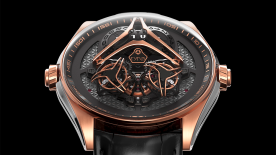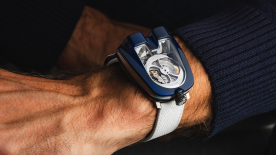Revue FH - 27 October 2011
Janine Vuilleumier
Nestled in the heart of the Joux Valley, the firm Dubois Dépraz designs, develops and constructs additional movements for watch complications for some of the greatest names in watchmaking, including Patek Philippe, Breitling, Rolex, Omega, Richard Mille, etc. Be it chronographs with multiple indications (with or without perpetual calendar), special mechanisms indicating days, months, leap years, moon phases, sunset and sunrise, the equation of time, tides, timezones, jumping-dials, governors, mechanisms for regattas, watches for polo, as well as minute, quarter and five-minute repeaters, extra-flat mechanisms, etc, the world of complications no longer holds any secrets for Dubois Dépraz. Around fifty brands currently employ the services of the firm, which is ready to rise to any challenge thrown down to it.
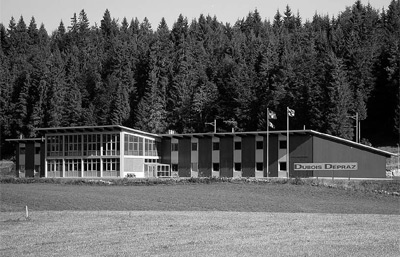
110 years of history have led Dubois Dépraz on the path to their present success. On 1st January 1901, Marcel Dépraz set up his first watchmaking workshop in Le Lieu, at number 12, Grand-Rue, over the family baker's shop. Ten years later, with a view to increasing his firm's capacity, he teamed up with his brotherin- law Marius Guignard. Together, they set up a second company: Dépraz & Guignard. Marcel's children, Gabrielle and Roger, also joined the family business. In 1937, Marcel Dépraz decided to strengthen his two companies and employed his son-in-law Reynold Dubois. Results were not long in coming, with the rapid launch of the 13 3/4 chronograph calibre. This master stroke saw the production of more than 4.5 million movements up to the 1970s. In 1947, the two firms merged under the name Dépraz & Cie. In 1956, Gérald Dubois, a young watchmaking engineer and father of the two present-day directors, set up a research and development design office.
Eleven years later the world's first modular chronograph was born, the 11-12 Chronomatic calibre. This invention was awarded the diploma and silver medal at the Brussels Inventors Show in 1969. Meanwhile, Dépraz & Cie changed its company name to Dubois Dépraz SA.
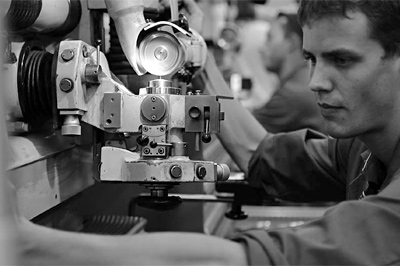
In the 1970s, despite the economic difficulties, the firm presented another world first, a mechanical chronograph with an analogue display featuring an electronic tuning-fork movement. In parallel, it diversified and embarked on the production of mechanical and quartz chronographs fitted as standard on aircraft and cars. Despite these launches, the crisis proved too strong for the partnership between the two directors and in 1979 Gérald Dubois purchased the buildings and continued the adventure alone. In 1983, after several years of research, Dubois Dépraz launched the calibre 2000 chronograph which could be adapted to all mechanical or quartz movements. This innovative concept caused a sensation in the watchmaking world and even today remains one of the firm's flagship products (around two million have been manufactured to date).
In 1987, Jean-Philippe Dubois, the current CEO, joined the company. He was followed five years later by his brother Pascal, who was appointed as director. Finally, in 2006, they acquired one of their suppliers, DPRM (Décolletage pignons et roues manufacture), located in Arch (canton of Bern).
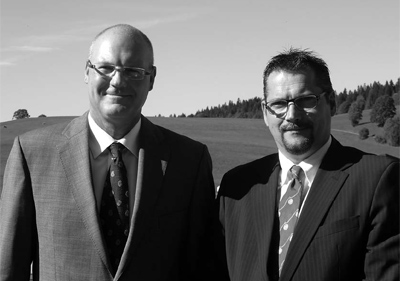
In the course of these eleven decades, Dubois Dépraz accumulated a huge wealth of expertise that was passed on from generation to generation. Even today the firm holds the secret of certain manufacturing phases no longer used by anyone else in the watchmaking world. An example is «tribofinishing», the process which consists in deburring and polishing pieces in a single operation. This involves turning pieces from one to seven days in sealed cylinders of different sizes, according to the desired end result. The media inside the rollers consist of different materials (copper, ceramic or plastic), special soap and polishing powder. Although the processes of deburring and polishing are widespread in the watch industry, Dubois Dépraz's secret lies in the dosing of components and the length of the operation.
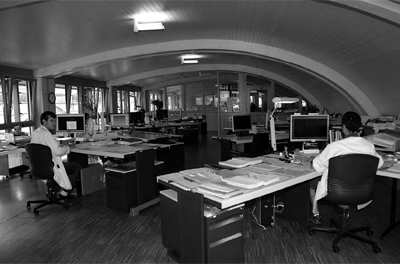
Manufacturing secrets alone would be worth nothing without skill, hard work, and the precision and quality of products delivered by Dubois Dépraz. Today, 220 people in the Joux Valley and 50 in Arch work industriously under the roof of this independent family business.




